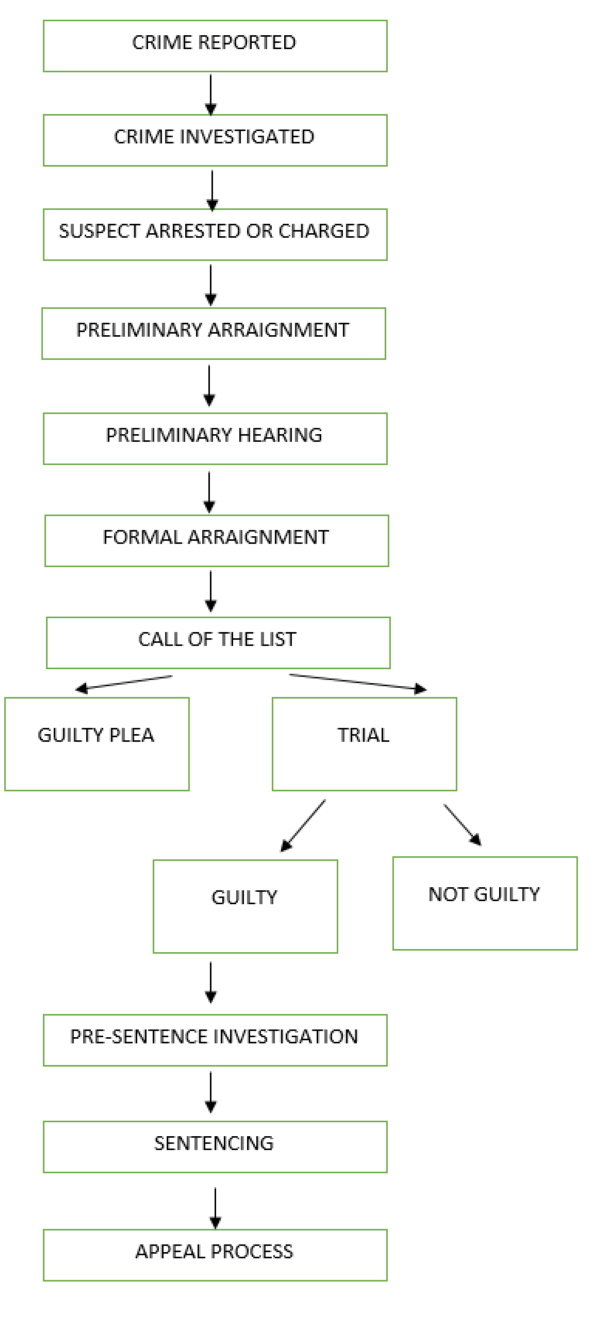Criminal Prosecution
Criminal Prosecution
Pennsylvania's Criminal Process
The criminal court process can be sometimes complicated and lengthy. Below you will find a summary of that process.
Summons
When charges are filed with the Magisterial District Judge, they can be mailed to the offender via summons. A summons directs the offender to appear for their preliminary hearing. The offender will receive a copy of the criminal complaint with the summons. A summons is frequently used for
misdemeanor offenses or those of a less serious nature where there is not a need to take the offender into custody.
Arrest
For serious offenses, the criminal case will begin with the offender being arrested by the police. When
that happens, the officer prepares the criminal complaint and the offender is taken to Lebanon County’s Central Booking facility. At Central Booking, the offender will be held until his/her preliminary
arraignment. It is at the preliminary arraignment where the offender will see the Magisterial District Judge and bail will be set. Bail can be set in a monetary or non-monetary amount. The bail amount depends on a variety of factors including, but not limited to: the seriousness of the criminal charges, the offender’s criminal history, the danger of flight, danger to the community or the victim of the offense, etc. The offender will be provided with a copy of the criminal complaint and is also given a date for the preliminary hearing.
Preliminary Hearing
A preliminary hearing is the first substantive court date that occurs. At a preliminary hearing, the offender can proceed one of two ways: hearing or waiver. Preliminary hearings are held every Thursday at the Lebanon County Municipal Building. They are held in the auditorium on the ground floor of the building.
In rare circumstances, the preliminary hearing may be held at the office of the Magisterial District Judge. The standard of proof at a preliminary hearing requires the Commonwealth (often represented by the District Attorney or the Attorney General) to establish a prima facie case. A prima facie case exists when the evidence presented, if accepted as true, would justify a finding that the offender committed the criminal act or acts charged. Should the offender wish to have a hearing, the Commonwealth presents evidence to support a finding of a prima facie case. If the Magisterial District Judge finds that a prima facie case exists, the charges will be held to court and sent to the Court of Common Pleas for further proceedings.
IF a case is Dismissed…
If the Magisterial District Judge finds that one or more charges are not supported by a prima facie case, those charges or the case in its entirety can be dismissed.
If a case is Waived…
If an offender is not seeking to challenge the evidence at this proceeding, they can execute a waiver of the preliminary hearing. A waiver advises a defendant of their right to a preliminary hearing to ensure they understand its purpose. A waiver of the preliminary hearing is not an admission of guilt. The case will then be sent to the Court of Common Pleas for further proceedings.
Criminal Information
After the charges proceed to the Court of Common Pleas, the District Attorney’s Office prepares a files a criminal information which sets for the charges against them. The criminal information incorporates the charges set forth by the officer in the criminal complaint. Any trial, guilty plea, and sentence is based upon the charges as they are listed in the criminal information.
Formal Arraignment
The next procedural step is Formal Arraignment. This is the defendant’s right to have his or her charges read aloud by a Judge in open court. In Lebanon County, there is a form which exists that sets out the rights a defendant has in regards to pretrial proceedings. In lieu of appearing in court, a defendant can complete a form acknowledging their understanding of their charges and the rights afforded to them.
Call of the List
Once per month cases are scheduled for Call of the List. This occurs usually the first Tuesday of every month. Cases which are at the stage of proceedings where a disposition can occur are scheduled for Call of the List. It is at this proceeding that a defendant can proceed one of three ways. First, they can enter a plea of guilty or no contest. Second, they can list their case for trial. Third, they can request a continuance to have their case relisted for another Call of the List date.
Trial
In a jury trial, a group of twelve citizens from Lebanon County will hear testimony and see evidence before rendering a verdict of guilty or not guilty on the charges presented. Jury trial terms are scheduled once per month for a one week or two week term. Cases are scheduled for trial and jury selection occurs typically on the Monday of the trial term week. Jury trials only happen during the prescheduled jury trial terms.
Bench, or non-jury, trials can be scheduled at any time. In a bench trial, the judge sits as the fact finder and renders a verdict after hearing the testimony and seeing the evidence.
Pre-Sentence Investigation
After a trial or guilty plea, Lebanon County Probation Services will prepare a pre-sentence investigation report when requested by the Court. This report provides the court with any relevant background
information on the defendant, their criminal record, and the sentencing ranges for the charges upon which sentence is being imposed.
Sentencing
Sentencings typically happen on Wednesday mornings. When requested, they can be specially scheduled on another day. During sentencing, a victim has the right to give a verbal or written impact statement to both the defendant and the Court. The Court imposes a sentence which begins immediately.
Appeal
After sentence has been imposed, a defendant may file an appeal challenging the sentence or any rulings made by the Court. The appeal can be a Post-Sentence Motion which is directed to the sentencing judge or an appeal to the Superior Court.

